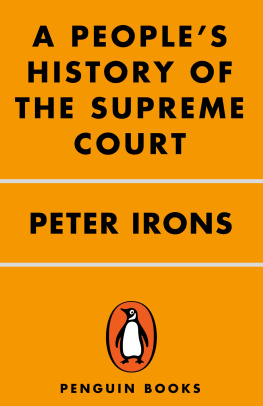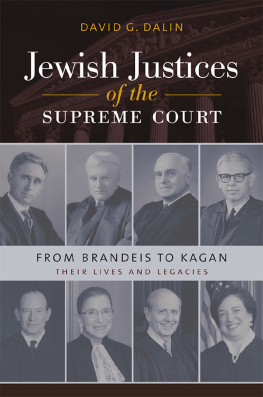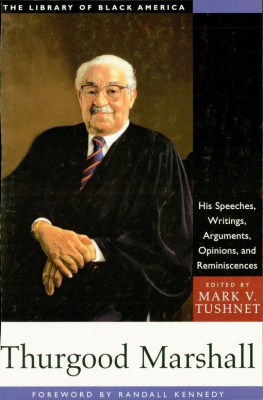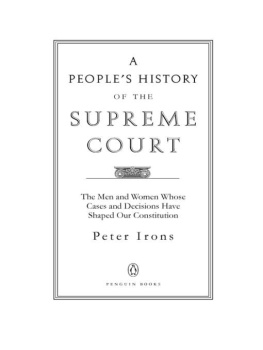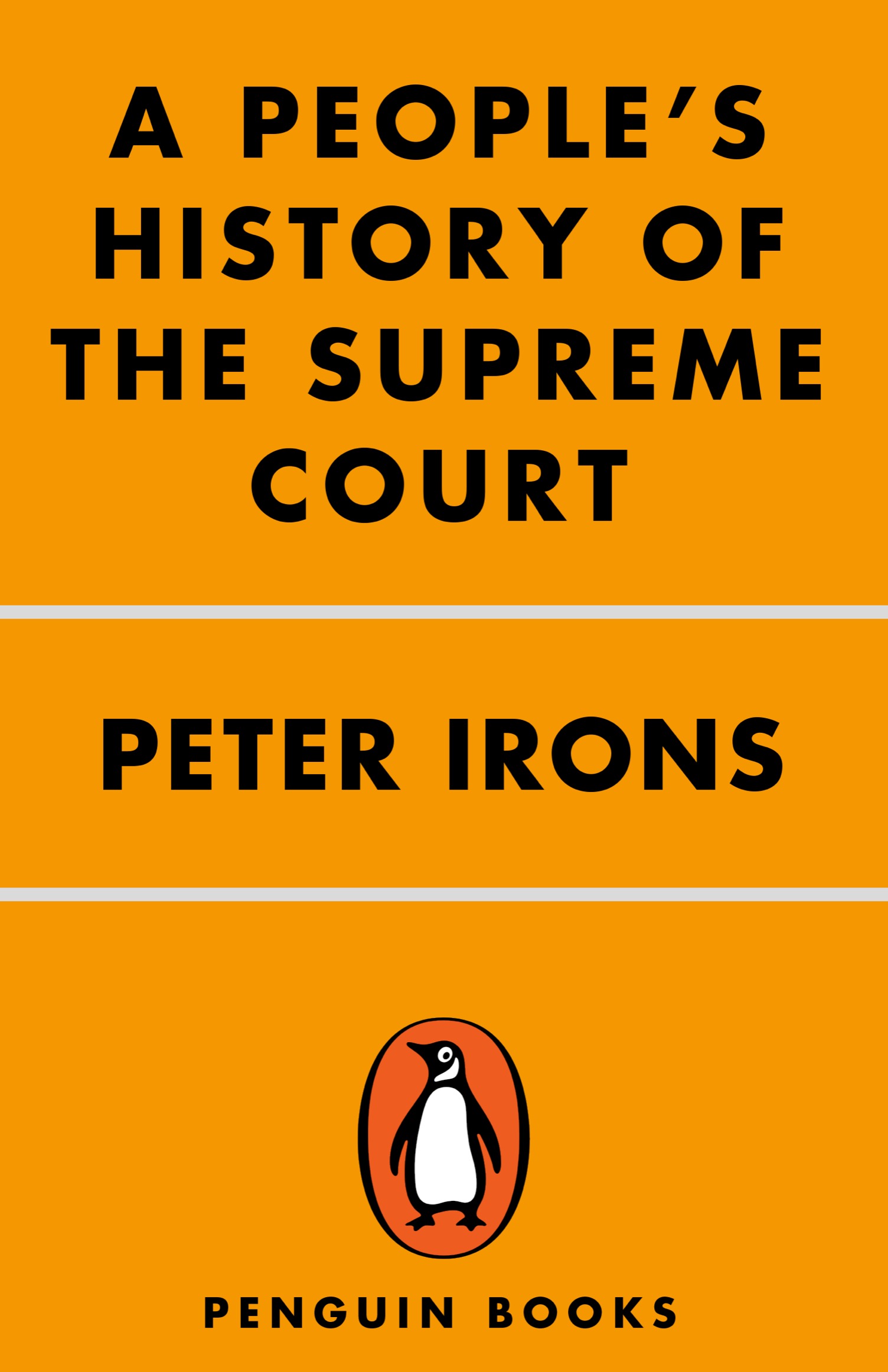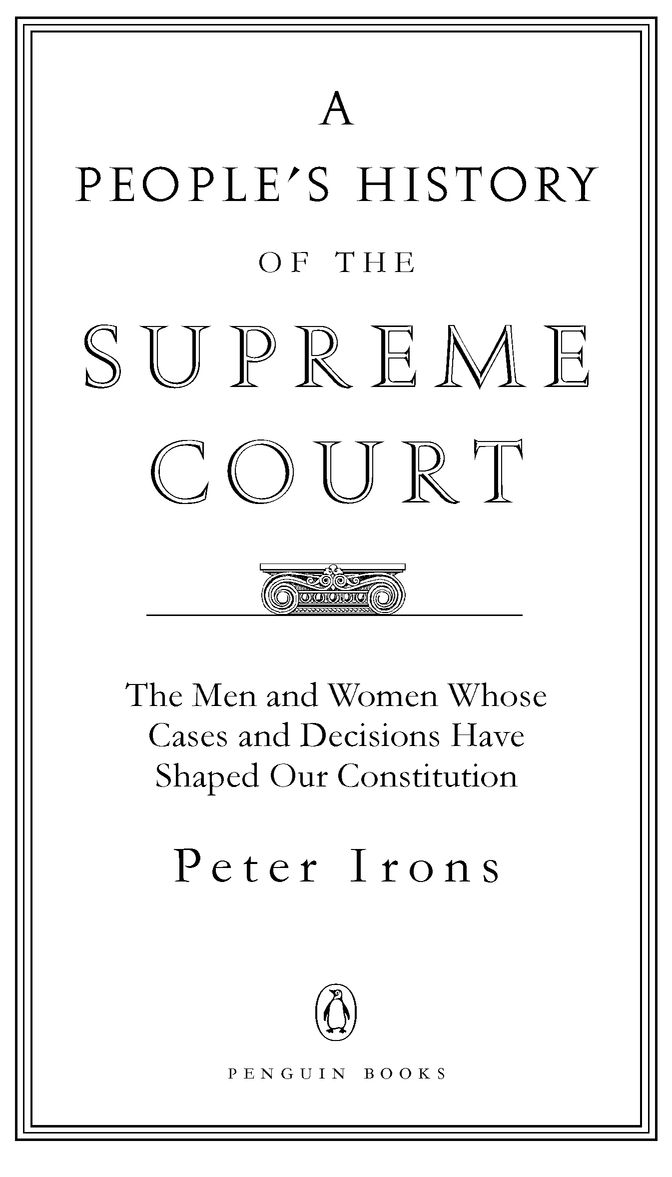Table of Contents
Praise for A Peoples History of the Supreme Court
Following in the footsteps of Howard Zinns A Peoples History of the United States, Peter Irons tackles a most unlikely subjectthe branch of government most remote from popular awareness and influence. A Peoples History of the Supreme Court... brings alive the sweeping effects of seemingly remote, abstract judicial concerns... Irons offers a unique and inspiring view in which the deeply political nature of the Supreme Court is not a weakness unless we, the people, allow it to be.
The Denver Post
Well-written and interesting... Irons performs a valuable service by focusing attention on the biggest question in constitutional law: What is the proper role of the Supreme Court in American life.
Chicago Tribune
Irons shines. He goes beyond the bare text of the decisions, telling poignant stories from his research about the men and women whose rights were at stake in each case. Best of all, it is written in a style accessible not only to lawyers and history buffs but to all people with a stake in our constitution system.
Star-Ledger
Riveting... Highly readable... Unlike many books on the nations third branch of government, A Peoples History of the Supreme Court is a lively and provocative book.
Houston Chronicle
[Irons] breathes abundant life into old documents and reminds readers that todays fiercest arguments about rights are the continuation of the endless American conversation.
Publishers Weekly (starred)
Peter Ironss outstanding new book masterfully draws upon his dual perspectives as both a leading constitutional scholar and a pathbreaking civil liberties advocate. This exciting book vividly recounts the dramatic stories behind the Courts landmark cases and memorably portrays the colorful individuals who brought and decided them. Every American should read this superb history of the Supreme Court.
Nadine Strossen, President, American Civil Liberties Union and Professor of Law, New York Law School
This intriguing book about the Supreme Court is both concise and comprehensive. Peter Irons, a lawyer and historian, has written a book which should be read by any American who wants to understand how the Constitution and the rule of law have operated in the United States.
Robert F. Drinan, S.J., Professor of Law, Georgetown University Law School
The landmark decisions of the U.S. Supreme Court come alive again in legal scholar Peter Ironss first-rate peoples history. It is a riveting saga about constitutional democracy at work, filled with vivid narrative portraits of such illustrious Supreme court justices as John Marshall, Oliver Wendell Holmes, and Thurgood Marshall. A truly indispensable book.
Douglas Brinkley, Director, Eisenhower Center for American Studies, University of New Orleans
ABOUT THE AUTHOR
Peter Irons is a professor of political science emeritus at the University of California, San Diego, where he taught constitutional law from 1982 to 2004 and directed the Earl Warren Bill of Rights Project. A Harvard Law School graduate and civil liberties lawyer, he is a member of the Supreme Court bar. In the 1980s, he initiated the successful legal effort to vacate the criminal convictions of Fred Korematsu and Gordon Hirabayashi for violating World War II military orders that led to the internment of Japanese Americans. His previous books include Justice at War, The Courage of Their Convictions, May It Please the Court, and Jim Crows Children, all of which received Silver Gavel awards from the American Bar Association. His most recent book is God on Trial: Landmark Cases from Americas Religious Battlefields. He lives in Greenville, California.
Dedicated to my daughters,
Haley Ellen Fox and
Maya Grace IronFox
FOREWORD
Although the Preamble to the United States Constitution begins with the words We the People... , the volumes upon volumes that deal with constitutional law are remarkably devoid of human beings. How many Americans, of the huge number who have heard of Brown v. Board of Education, know that Brown refers to Oliver Brown and his eight-year-old daughter Linda in Topeka, or know anything about the long struggle of their family to bring the case before the highest court in the land?
How many, even if they have studied constitutional law and argued the case of Tinker v. Des Moines, know (unless they have read Peter Ironss wonderful book The Courage of Their Convictions) the human story of Mary Beth Tinker, the thirteen-year-old suspended from school in 1965 for wearing a black armband in school to protest the war in Vietnam?
It is this situation that Peter Irons has set out to remedy, with a history of the Supreme Court that breathes life into the dry language of the judicial system, that looks behind the cases to the human beings crucial to the cases but long forgotten, that examines the realities of social conflict beneath the surface of legal argument.
The document created by the Founding Fathers was born of intense conflicts of race and class, yet there has always been a certain aura of disinterestedness around the decisions of the Supreme Court, notwithstanding the adversarial character of the cases before it.
Sharp divisions of interest are concealed behind abstract legal arguments. Substantive issues are obscured and arguments advanced, decisions made, based on technicalities of law. In the austere chambers of the Court, life-and-death matters are decided in an atmosphere of genial academic debate. It is a contribution of this book that the human beings behind these legal arguments are brought to the fore, giving the debates their proper significance.
At the highest levels of legal discourse, and embedded in popular belief, is the notion that something called precedent has ironclad power. The result of holding to this was long ago observed by Jonathan Swift in
Gullivers Travels:It is a maxim among lawyers, that whatever hath been done before may legally be done again: and therefore they take special care to record all the decisions formerly made against common justice and the general reason of mankind. These, under the name of precedents, they produce as authorities, to justify the most iniquitous opinions; and the judges never fail of directing accordingly.
Swifts irony is an exaggeration of course, but with a great deal of truth in it. The deference to precedent, without regard to common justice, will be found again and again in these pages, as Professor Irons takes us through the fascinating history of the Supreme Court and its decisions.
Yet, precedents are broken when the social forces demand it. Thus, it took more than half a century to overturn the principle of separate but equal enunciated in the case of Plessy v. Ferguson. Its overturn came not, as it might seem from a superficial reading of the arguments, from a reconsideration of the language of the Fourteenth Amendment, but from tumultuous changes in the United States and in the world: the disintegration of old colonial empires, the legacy of war, and the emergence of a movement among black people for equal rights.

